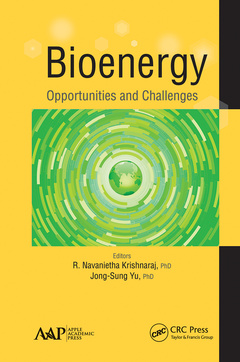Bioenergy Opportunities and Challenges
Coordonnateurs : Krishnaraj R. Navanietha, Yu Jong-Sung

Energy is one of the prime needs of the modern world, and energy demands have been rapidly increasing in the recent years owing to rapid advancements in industrialization and population explosion. Conventional fossil fuels are being depleted at rapid rates, and the use of conventional sources such as coal or nuclear sources cause several hazards to the environment. New sources of fuel, such as bioenergy, are an ideal option for fulfilling ever-increasing energy demands. This important book offers an exploration of these alternate fuel sources, including biohydrogen, microbial fuel cells, bioethanol, and biodiesel production, focusing on the challenges and factors hindering the real-time application of these bioenergy sources.
Researchers all over the world are working in this energy sector, and this has led to drastic improvements in bioenergy research. However, the technology gap between research and industrial application still exists. This important book offers engineers and technologists from different disciplines valuable information on this multifaceted field. The field of bioenergy is interdisciplinary, requiring the knowledge of biologists, chemists, physicists, and engineers. Exploring the current trends and future prospects for biofuels, the information presented in this book will be valuable to the international industrial community for identifying new options to circumvent problems that exist in bioenergy applications.
Topics include:
? Thermophilic biohydrogen production
? Bio-hydrogen production
? Microbial fuel cells as a promising alternative energy source
? Microbial fuel cell applications
? Potential of Pscillatoria annae in producing bioethanol
? Potential of lignocellulosic biofuels
? Biodiesel production
? Reactor designs for biodesel production
? Long-term storage stability of Pongamia pinnata and Jatropha curcus biodiesel
Preface. Section 1: Biohydrogen Production. Section 2: Microbial Fuel Cells. Section 3: Bioethanol Production. Section 4: Biodesel Production. Section 4: Catalysis for Biofuels. Index.
R. Navanietha Krishnaraj, PhD, is currently working as the technical officer in National Institute of Technology in Durgapur, India. Before joining NIT Durgapur, he was working at CSIR-Central Electrochemical Research Institute. He holds a BTech in biotechnology and PhD in the field of microbial fuel cells. His areas of interests include bioelectrocatalysis and nanobiotechnology. He has authored several research articles in reputed journals and is a life member of several professional bodies.
Prof. Jong-Sung Yu is one of the most renowned scientists in the field of electrochemical science. He is currently a professor in the Department of Advanced Materials Chemistry at Korea University in Seoul, South Korea. He received a bachelor of science in chemistry from Sogang University in 1983 in Korea and a PhD in chemistry at the University of Houston, Houston, Texas, USA, in 1990. He has several years of rich post-doctoral experience at Ohio State University, the University of Houston, Pennsylvania State University, and Northwestern University. He is currently on the editorial board of the Journal of Experimental Nanoscience (Taylor and Francis), Frontiers in Fuel Cells, and Carbon Letter (Korean Carbon Society). He was awarded an Excellent Research Award from the Inorganic Chemistry Division in 2011 and from the Material Chemistry Division in 2004 of the Korean Chemistry Society. He was also given a Korea Strategic Research Grant (2010–2015) in energy application. He has authored about 190 peer-reviewed articles and 60 patents. His research interests lie in nanostructured materials for storage, delivery, and conversion with particular attention toward electrochemical applications, such as fuel cell, battery, capacitor, solar cell, and sensors.
Date de parution : 03-2021
15.2x22.9 cm
Date de parution : 07-2015
15.2x22.9 cm
Thème de Bioenergy :
Mots-clés :
MICROBIAL FUEL CELLS; Tamil Nadu; microbial; MFC Application; fuel; Transesterifi Cation; cell; Lignocellulosic Biomass; lignocellulosic; Proton Exchange Membrane; biomass; Bioethanol Production; corn; Mmol H2; stover; Mol H2; transesterifi; Bio-hydrogen Production; cation; Jatropha Biodiesel; biodiesel; BioH2 Production; MICRO-CHANNEL REACTOR; Proton Exchange Membrane Fuel Cells; Pongamia Biodiesel; Jatropha Curcas Seeds; H2 Production; Seed Mycoflora; Moisture Content; Single Chamber MFC; Coir Pith; Amber Glass Bottle; Physic Nut; Caldicellulosiruptor Saccharolyticus; Fuel Cells



